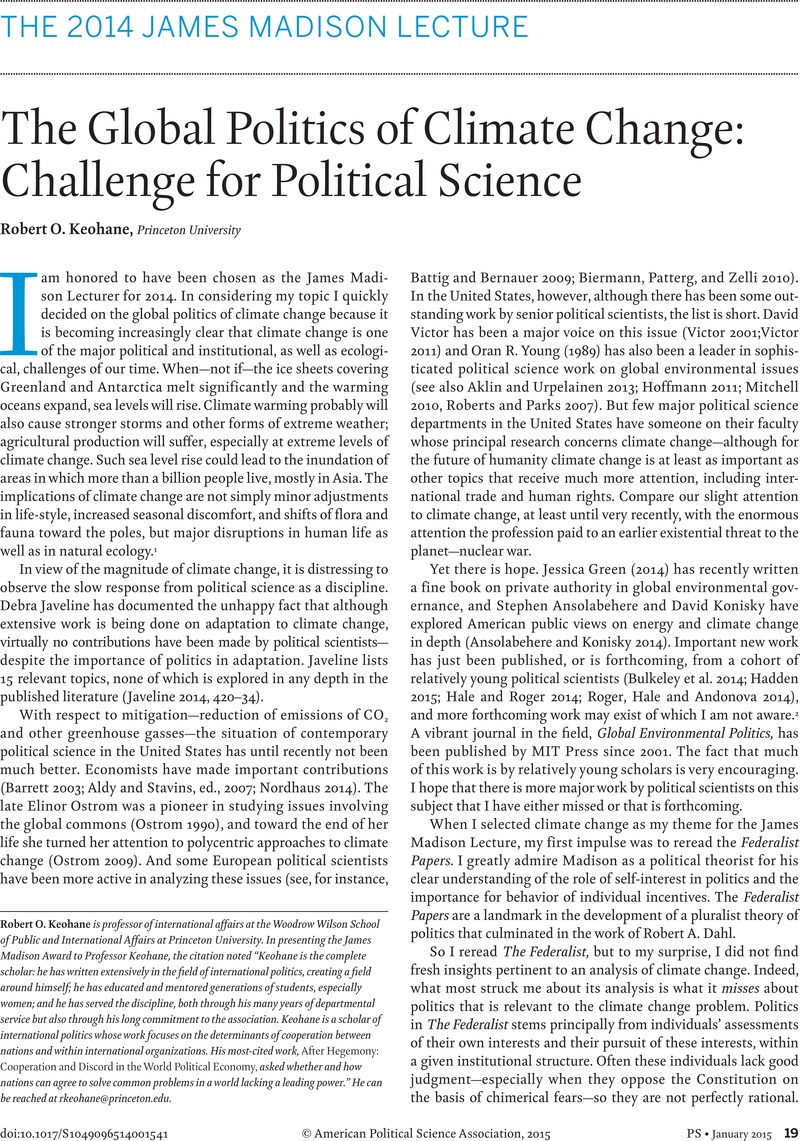Crossref Citations
This article has been cited by the following publications. This list is generated based on data provided by Crossref.
Ray, Aaron
Hughes, Llewelyn
Kaylor, Charles
and
Konisky, David
2016.
Extreme Weather Exposure and Support for Climate Change Adaptation.
SSRN Electronic Journal ,
Le Clercq, Juan Antonio
2016.
Handbook on Sustainability Transition and Sustainable Peace.
Vol. 10,
Issue. ,
p.
505.
Horton, Joshua B.
and
Reynolds, Jesse L.
2016.
The International Politics of Climate Engineering: A Review and Prospectus for International Relations.
International Studies Review,
Vol. 18,
Issue. 3,
p.
438.
Kline, Reuben
Seltzer, Nicholas
Lukinova, Evgeniya
and
Bynum, Autumn
2016.
Differentiated Responsibilities and Prosocial Behavior in Climate Change Mitigation: Behavioral Evidence from the United States and China.
SSRN Electronic Journal,
Dalby, Simon
2016.
Framing the Anthropocene: The good, the bad and the ugly.
The Anthropocene Review,
Vol. 3,
Issue. 1,
p.
33.
Fairbrother, Malcolm
2016.
Externalities: why environmental sociology should bring them in.
Environmental Sociology,
Vol. 2,
Issue. 4,
p.
375.
2016.
Governing for the Future: Designing Democratic Institutions for a Better Tomorrow.
Vol. 25,
Issue. ,
p.
497.
Lane, Melissa
2016.
Political Theory on Climate Change.
Annual Review of Political Science,
Vol. 19,
Issue. 1,
p.
107.
Goldstein, Joshua S.
2016.
Climate Change as a Global Security Issue.
Journal of Global Security Studies,
Vol. 1,
Issue. 1,
p.
95.
Rösch, Felix
and
Watanabe, Atsuko
2017.
Approaching the unsynthesizable in international politics: Giving substance to security discourses throughbasso ostinato?.
European Journal of International Relations,
Vol. 23,
Issue. 3,
p.
609.
Hughes, Terry P.
Barnes, Michele L.
Bellwood, David R.
Cinner, Joshua E.
Cumming, Graeme S.
Jackson, Jeremy B. C.
Kleypas, Joanie
van de Leemput, Ingrid A.
Lough, Janice M.
Morrison, Tiffany H.
Palumbi, Stephen R.
van Nes, Egbert H.
and
Scheffer, Marten
2017.
Coral reefs in the Anthropocene.
Nature,
Vol. 546,
Issue. 7656,
p.
82.
Mintrom, Michael
and
Luetjens, Joannah
2017.
Policy entrepreneurs and problem framing: The case of climate change.
Environment and Planning C: Politics and Space,
Vol. 35,
Issue. 8,
p.
1362.
Acar, Canan
and
Dincer, Ibrahim
2017.
Energy and exergy analyses of a novel photoelectrochemical hydrogen production system.
International Journal of Hydrogen Energy,
Vol. 42,
Issue. 52,
p.
30550.
Underdal, Arild
2017.
Climate Change and International Relations (After Kyoto).
Annual Review of Political Science,
Vol. 20,
Issue. 1,
p.
169.
Meckling, Jonas
Sterner, Thomas
and
Wagner, Gernot
2017.
Policy sequencing toward decarbonization.
Nature Energy,
Vol. 2,
Issue. 12,
p.
918.
Ponte, Alessandro Del
Delton, Andrew W.
Kline, Reuben
and
Seltzer, Nicholas A.
2017.
Passing It Along: Experiments on Creating the Negative Externalities of Climate Change.
The Journal of Politics,
Vol. 79,
Issue. 4,
p.
1444.
Acar, Canan
and
Dincer, Ibrahim
2018.
Thermodynamic analysis and experimental investigation of a unique photoelectrochemical hydrogen production system.
International Journal of Hydrogen Energy,
Vol. 43,
Issue. 9,
p.
4223.
Hamilton, Matthew
and
Lubell, Mark
2018.
Collaborative Governance of Climate Change Adaptation Across Spatial and Institutional Scales.
Policy Studies Journal,
Vol. 46,
Issue. 2,
p.
222.
Meckling, Jonas
2018.
The developmental state in global regulation: Economic change and climate policy.
European Journal of International Relations,
Vol. 24,
Issue. 1,
p.
58.
Riva, Silvia
2019.
Cognitive tips for changing mindsets: improving policies to protect health and environment.
Journal of Epidemiology and Community Health,
Vol. 73,
Issue. 11,
p.
985.



